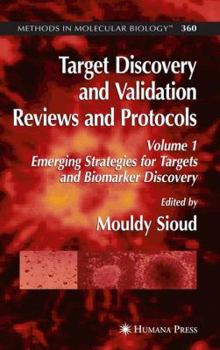Target Discovery and Validation Reviews and Protocols: Emerging Strategies for Targets and Biomarker Discovery, Volume 1
Select Format
Select Condition 
Book Overview
Target discovery is a field that has existed for several years but is so vibrant today because of the recent progress in our understanding of the molecular mechanisms of many human diseases and the technical advances in target identification and validation. More sophisticated gene profiling technologies, such as DNA microarrays and serial analysis of gene expression, permit rapid identification of lead targets. Moreover, analysis of gene networks in living organisms allows the identification of target genes that operate in defined physiological pathways. With the sequencing of several genomes completed and the rapidly growing gene expression databases, there is now greater impetus than ever before for in silico discovery of therapeutic targets. Also, recent advances in genetic technologies have increased our ability to generate mouse models for human diseases. The implications of these genetically modified animals in drug development are several, including identification of new drug targets, predicting efficacy, and uncovering possible side effects. Together, these recent technical advances should allow researchers to make the most informed choice early and advance the chosen targets toward clinical studies. Regarding cancers, any difference between a cancer and a normal cell could potentially be exploited as a therapeutic target. The hope is that drugs targeting specific constituents or pathways in cancer cells will provide more effective therapy, either alone or in combination with other currently used anticancer drugs. In addition to drug targets, identifying new target antigens remains as much of a challenge as improving tumor vaccines already in the clinic.
Format:Paperback
Language:English
ISBN:161737699X
ISBN13:9781617376993
Release Date:November 2010
Publisher:Humana
Length:354 Pages
Weight:1.19 lbs.
Dimensions:0.8" x 6.0" x 9.0"
Customer Reviews
0 rating





